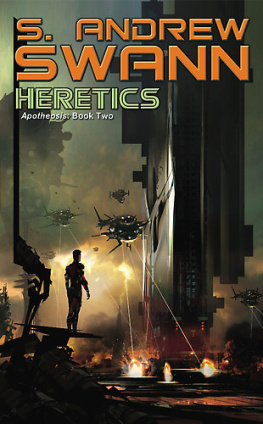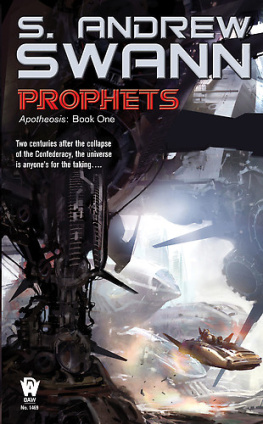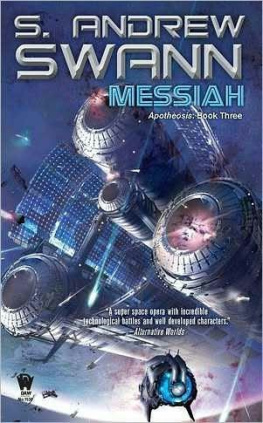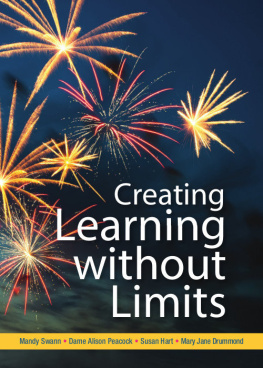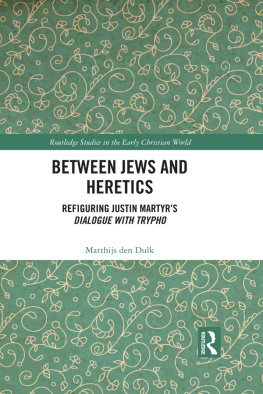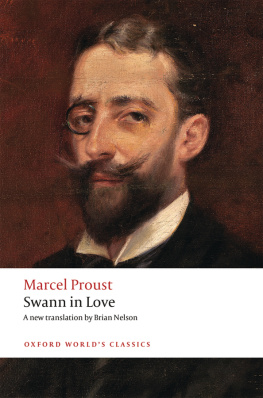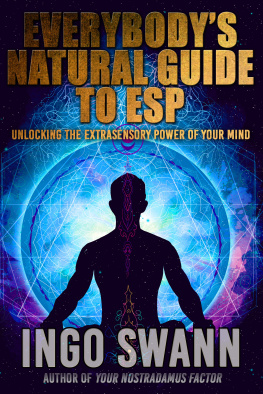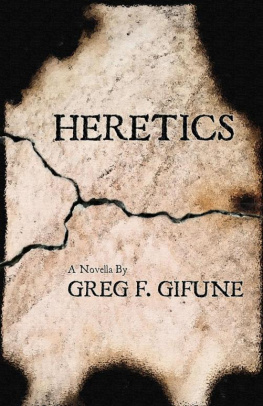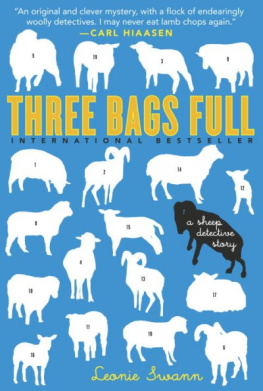S. Andrew Swann - Heretics
Here you can read online S. Andrew Swann - Heretics full text of the book (entire story) in english for free. Download pdf and epub, get meaning, cover and reviews about this ebook. year: 2010, publisher: Penguin Group USA, genre: Detective and thriller. Description of the work, (preface) as well as reviews are available. Best literature library LitArk.com created for fans of good reading and offers a wide selection of genres:
Romance novel
Science fiction
Adventure
Detective
Science
History
Home and family
Prose
Art
Politics
Computer
Non-fiction
Religion
Business
Children
Humor
Choose a favorite category and find really read worthwhile books. Enjoy immersion in the world of imagination, feel the emotions of the characters or learn something new for yourself, make an fascinating discovery.
- Book:Heretics
- Author:
- Publisher:Penguin Group USA
- Genre:
- Year:2010
- Rating:3 / 5
- Favourites:Add to favourites
- Your mark:
- 60
- 1
- 2
- 3
- 4
- 5
Heretics: summary, description and annotation
We offer to read an annotation, description, summary or preface (depends on what the author of the book "Heretics" wrote himself). If you haven't found the necessary information about the book — write in the comments, we will try to find it.
Heretics — read online for free the complete book (whole text) full work
Below is the text of the book, divided by pages. System saving the place of the last page read, allows you to conveniently read the book "Heretics" online for free, without having to search again every time where you left off. Put a bookmark, and you can go to the page where you finished reading at any time.
Font size:
Interval:
Bookmark:
HERETICS
Aphoteosis: Book Two
S. Andrew Swann

DRAMATIS PERSONAE
Survivors of the Eclipse
Father Francis Xavier Mallory Roman Catholic priest and veteran of the Occisis Marines.
Nickolai Rajasthan Exiled scion of the House of Rajasthan. Descendant of genetically
engineered tigers.
Vijayanagara Parvi Mercenary pilot from Rubai.
Jusuf Wahid Mercenary from Davado Poli.
Julia Kugara Mercenary from Dakota. Descendant of genetically engineered humans.
Former member of Dakota Planetary Security (DPS).
Dr. Sharon Drner Xenobiologist from Acheron.
Dr. Samson Brody Cultural anthropologist from Bulawayo.
Dr. Leon Pak Linguist from Terra.
Rebecca Tsoravitch Data analyst from Jokul.
Salmagundi
Flynn Jorgenson Forestry surveyor.
Alexander Shane Senior member of the Grand Triad.
Styx
Toni Valentine Lieutenant in the Styx Security Forces under Styx System Security Command (3SEC)
Karl Stavros Captain of the Centauri trading vessel Daedalus.
Stefan Stavros Karl Stavros' son.
CONTENTS
SECOND PROLOGUE
Rituals
"...every man must get to heaven his own way."
FREDERICK THE GREAT
(1712-1786)
CHAPTER ONE
Prophets
"We rely on our ignorance to keep us sane."
The Cynic's Book of Wisdom
"Knowledge without conscience is the ruination of the soul."
FRANCOIS RABELAIS
(1495?-1553)
On the fourth day of the sixth month of the 2526th year of the standard Terran calendar, 600,000 kilometers from a lost colony world named Salmagundi, orbiting a star with a catalog ID of HD 101534, the being that had called himself Tjaele Mosasa ceased his three centuries of existence at the hands of a being who called himself Adam.
In one sense, Mosasa's death was murder; in another sense, it could be considered an elaborate suicide.
There had been a human named Tjaele Mosasa once, centuries ago. That man resurrected five Race AIs, flouting every human law against such heretical technologies. That Mosasa had been an outlaw too long to care that the vast majority of humanity would consider the gestalt entity he created an abomination. Not only because of the artificial minds he had re-created, but because they were an artifact of humanity's opponents in the Genocide War.
Mosasa the simulacrum was born when the human Mosasa died, bequeathing his mind to the entity he had created. The ersatz Mosasa bore the human's mind and likeness and became caretaker to the whole.
That had been the first break in the unity of the five.
Only part of Mosasa interacted with the human world, taking the identity of the long-dead human Mosasa. Within that golem watched a pitiless, manipulative computer designed by the only alien species to wage war on mankind, a war that the amoeboid Race only lost because of a cultural prohibition on direct violence.
All five AIs bore the weight of the alien commandments programmed within their coresthe directive to destroy the human Confederacy. The Race had bequeathed them a subtle weapon for that task: a precise analytical perception of society, politics, culture, and economicsa view of the vast sweep of history itself.
Even though the Genocide War was long over; even though the Race had been slaughtered all the way back to their homeworld orbiting Procyon; even though the Race was quarantined beneath massive automated weapons platforms that blew away anything that tried to leave the gravity well; even a century after the fact, Mosasa's quintet of AIs still fought that war.
The lawless world Bakunin became their home; the lack of a State to enforce laws against heretical technology preserved their existence. The nature of the world itself helped destabilize the larger Confederacy surrounding it. The AIs used the Race's social manipulation to preserve the unstable equilibrium on the planet as they worked on their long plans to rescue their creators.
As they served the larger goal, the necessity to infiltrate the human world and adopt personas to interact with their foes caused the original gestalt to break down. The AIs became individuals. And as the Confederacy collapsed, the government imploding until it could only claim sovereignty over Terra itself, two of those AIs were lost.
Five became three.
The trio that returned to Procyon were long removed from the single mind they had once been. Their thoughts still overlapped, but they had long been more of themselves than they were of each other.
One third called itself Mosasa, a machine built in the shape of a man long dead, down to tattoos linking him to a spaceborn tribe that ceased to exist before the Confederacy had been born.
One third bore the name Random Walk and carried its Race-built brain inside a robotic body that pretended to be nothing other than a mechanical construct.
The final third was named Ambrose, who had been a spy in the heart of the Confederacy, the heresy of his artificial mind buried under the organic components of a biological body that had once been human. A man cybernetically rebuilt to the very edge of the Confederacy's taboos.
The three returned to Procyon as saviors, their program fulfilled, to release their creators from their bondage, to allow the Race to return to their rightful place in the universe.
They arrived two centuries too late.
The Race's aversion to direct violence arose partly because of the fragility of the environment on their homeworld. Their defeat taught them an evil lessondirect violence could be decisive in the face of every other alternative. In less than a generation, those of the Race that took that lesson to heart annihilated those that had not. Another generation and those victors managed to slaughter each other, destroying the biosphere of their marginally habitable planet.
Mosasa's trio had triumphantly returned to a dead world.
Random Walk was the purest of the three, the one who had suffered the least change from when he had been built. With no Race to serve, there was no purpose to Random's existence. The AI Random Walk realized this, the electrical impulses in his brain flickered and died, and his mechanical corpse collapsed in the dust of his extinct god's world.
Five became two.
Enough of Ambrose's body was human that he had to carry a rebreathing mask in order to walk abroad in the ash-scarred air. His human biology had also bequeathed something else to him.
Rage.
Ambrose screamed at the empty world, howling at the caverns where the flesh of the only deity they had known once lived. In the collapse of his sanity he tried to kill Mosasa. In his blind fury he ignored the fact that Mosasa's neck was polymer, carbon-fiber, and steel, and his own hands were little more than imitation flesh and bone. Still, Ambrose attempted to choke the life from his cybernetic brother, crushing flesh both real and artificial, until blood seeped from between his fingers.
He screamed pleas and obscenities into Mosasa's face, blaming him for the death of the Race, for leading them to this place, for bearing the responsibility of the human being who had taken those five AIs from the wreckage of the war and resurrected them just enough so they could see the death of the only thing that had mattered. Ambrose blamed Mosasa for the purposelessness of the universe.
And the purposeless universe laughed at him, because Mosasa refused to die.
Ambrose released his brother and ran away into the dead wilderness, screaming for survivors. Screaming to find his creators. Screaming for God.
Font size:
Interval:
Bookmark:
Similar books «Heretics»
Look at similar books to Heretics. We have selected literature similar in name and meaning in the hope of providing readers with more options to find new, interesting, not yet read works.
Discussion, reviews of the book Heretics and just readers' own opinions. Leave your comments, write what you think about the work, its meaning or the main characters. Specify what exactly you liked and what you didn't like, and why you think so.

